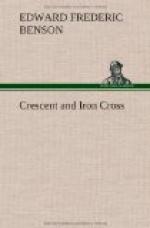As we have had previous occasion to note, this ejection of the Turkish power from Constantinople is the absolute reversal of European and, in especial, of English policy for the last hundred years. No crime that the Ottoman Government could commit, no act of barbarism, would ever persuade us to do away with the anachronism of Turkey’s existence in Europe; but at last the seismic convulsion of the war has knocked this policy into a heap of disjected ruins, and it can never be rebuilt again on the old lines. For among our other avowed objects in prosecuting the war to its victorious end, we have pledged ourselves to uphold the right which all peoples, whether small or great, have to the enjoyment of full security and free economic development. But while Turkey can close the Straits at her own arbitrary will, or at the bidding of a superior and malevolent Power, and block the passage of ships from Russian and Rumanian ports into the Mediterranean, the economic development of both these countries is seriously menaced. Three times within the last six years has she exercised that right, and while she holds the shores of the Straits she can at any moment blockade all southern Russian ports. That such power should be in the hands of any nation is highly undesirable; that it should be in the hands of a corrupt despotism like Turkey, especially now that Germany, as things stand, can dictate to Turkey when and what she pleases, is a thing unthinkable by the most improvident of statesmen. Already we have paid dearly enough for the pusillanimity of a hundred years: it is impossible that we should ever allow a similar bill to be again presented. Whatever be the guardianship of the Straits, whoever the holder of Constantinople, it will not be Turkey.
At the beginning of the war, and indeed till after the revolution in Russia, it was announced and stated as an axiom that on the conclusion of peace, Russia should be the door-keeper of what after all is her own lodge-gate. Subsequently, in the unhappy splits and disintegration of her Government, it was announced that she favoured peace without annexation—in other words, that she neither claimed nor desired the guardianship of Constantinople. But I think we should be utterly wrong if we regarded that as an expression of the will of the Russian people: it is far more probable that it was the expression of the will of Germany, directly inspired by German influence with a view to concluding a separate peace with Russia. As we have seen, it had its due effect in Turkey, and Talaat Bey gave vent to pious ejaculations of thanksgiving, that now all cause of quarrel with Russia was removed, and Turkey and she could be friends. It is possible that when out of the confused cries there again rises from Russia the clear call of the people’s voice, we shall find her wishing to set in order her own house before she projects herself on new missions, but, as far as the manifesto of ‘peace without territorial annexation’ goes, we shall be wise to regard it for the present with the profoundest suspicion. It sounds far more like the tones of the Central European wolf than those of Little Red Riding Hood’s proper grandmother.




